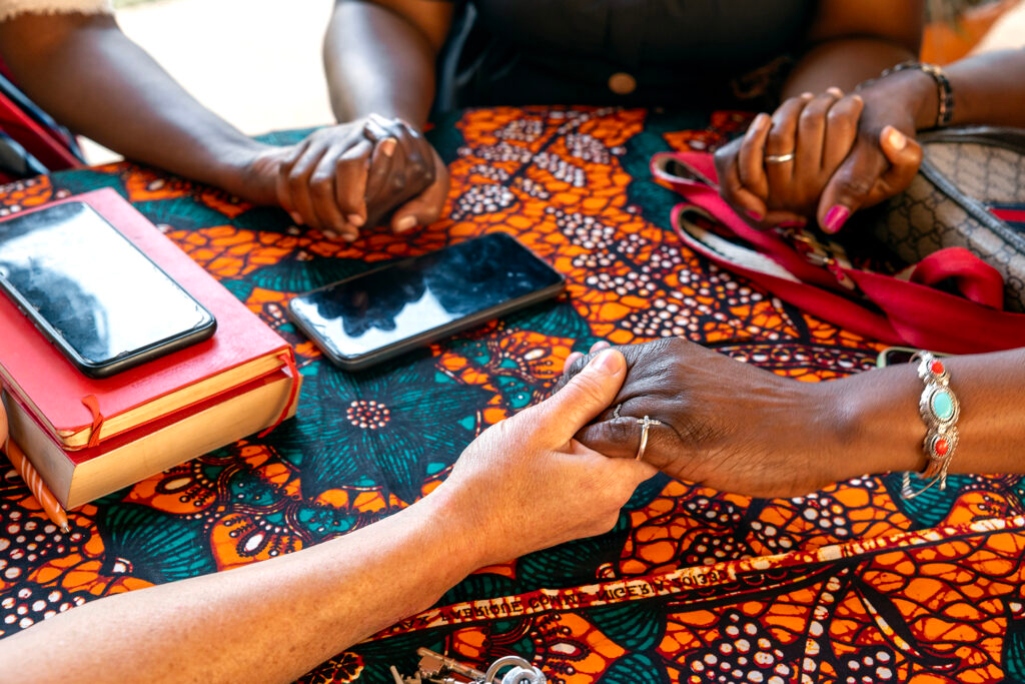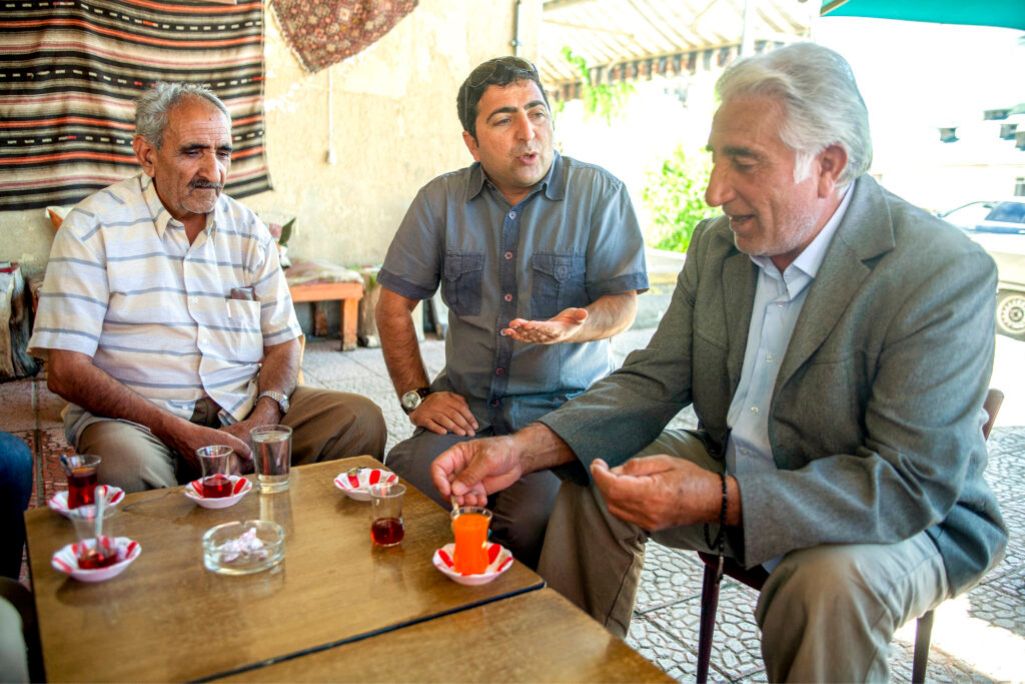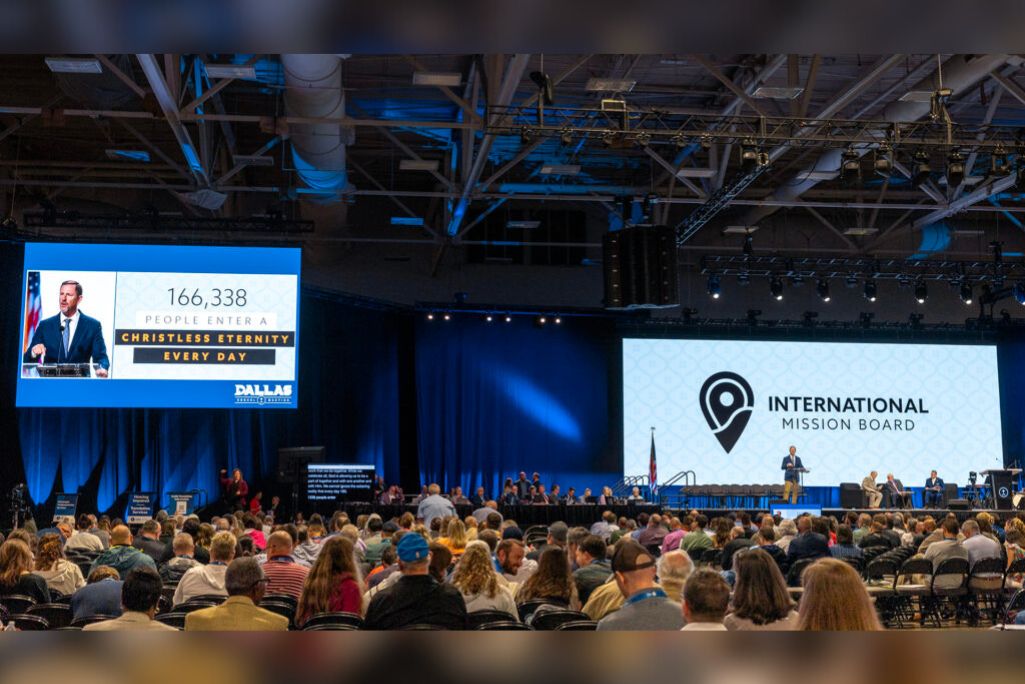
At a fellowship tea hosted at the Baptist Theological Seminary of Zambia, a group of women united in prayer deeply connect and grieve together over a recent miscarriage. The gathering, which includes an IMB missionary and pastors’ wives from various places, forms a supportive and heartfelt bond.
Michelle Chitwood tilted her head as she slowly looked around the courtyard. The wife of the International Mission Board (IMB) president wanted to take in every aspect of this pastors’ wives tea in Lusaka, Zambia.
At one table, four heads bowed in prayer. A few hours ago, these women — from Michigan, Missouri and Zambia — were strangers, but now they clasped hands and poured their hearts out to God about the trials of planting new churches in their communities. Two tables over, an IMB missionary and pastors’ wives from Zambia and Michigan mourned over a miscarriage. Another table of older women giggled as their prayers morphed into humorous ministry mishaps during their collective 90 years of service.
These interactions summed up the reason Chitwood and Lynette Ezell, wife of the North American Mission Board’s (NAMB) president, co-hosted a short-term mission trip to Zambia for Baptist state executive wives and NAMB missionaries.
“We really are better together,” Chitwood said, pointing to the many similarities between ministries despite thousands of miles that normally separate the women. “Spiritual lostness is the greatest problem in North America. It’s the greatest problem in Zambia. It’s the greatest problem among all the nations.
“When we work together, I think it brings unity,” Chitwood said about partnering with NAMB. She explained how being with people in another culture and building relationships will help churches in the U.S. strengthen their commitment to missions.
“This makes you more aware of lostness and a better advocate for our missionaries,” Chitwood said.
The team from Arkansas, Georgia, Michigan, Missouri and Virginia worked with ongoing ministries and caught a vision of how their own Southern Baptist churches could develop a closer partnership with the IMB.
For Tara Fowler, Missouri Baptist executive director’s wife, working alongside both IMB missionaries and Zambian believers made her excited. She used skills learned as an elementary school principal to lead children in games, teach Bible stories and speak at a Parent Teacher Association meeting.
“This trip has shown me a side of missionary life that I’ve never seen before,” Fowler said.
She experienced most of the components of the missionary task — entry, evangelism, discipleship, healthy church formation, leadership development and exit to partnership — in just one week. These six tasks are part of the biblical work of every IMB missionary who introduces the gospel to a people group and then continues to work among them until a healthy church of local believers is ready to carry on the Great Commission task.
The team of women worked with a Zambian church member who used soccer to create gospel access within a community living around the edges of the city trash heaps. They shared the gospel in a hospital ward with someone who had never heard of God’s mercy. They discipled teachers and parents. They empowered a young Zambian pastor and his church in reaching their impoverished community through Christ-centered compassion projects. They even witnessed an aspect of “exit to partnership” when the IMB handed over the property title of the local Baptist seminary to the Zambian Baptist Fellowship.
This wide array of ministries was a perfect introduction to the IMB for Mollie Diaz and Marisa Roberson. As NAMB missionaries with their husbands in Michigan, their attention is focused stateside. This trip allowed them to see how small churches like their own play a role in reaching the nations.
“I knew of the IMB before, but now the blinders have been removed and I see the impact,” Roberson said about the experience. “I see the teen boy staying out of trouble and learning about God on the soccer field. I see a group of Zambian church women praying with the sick in a hospital. Most importantly, I see where my church has a role in all of it.”
Through giving to the Cooperative Program, Lottie Moon Christmas Offering® and Annie Armstrong Offering®, churches provide financial means for the gospel to spread all around the world. Through sending missionaries and going on short-term mission trips, churches provide the feet for this message to travel and take root. And as Diaz and Roberson pointed out, through churches partnering and praying for each other — like those in Michigan and Zambia — God’s work is accomplished.
This vision was exactly what Ezell hoped the women who are focused on work in the U.S. would discover when they rolled up their sleeves and worked side-by-side with IMB missionaries.
“We need one another to get the gospel to all the nations,” Ezell said, explaining her passion for both mission agencies. “Southern Baptist churches have a heart for the lost, no matter where they are — next door, another state or country. The Lord calls us to work together.”
(EDITOR’S NOTE — Sue Sprenkle writes for the IMB.)


